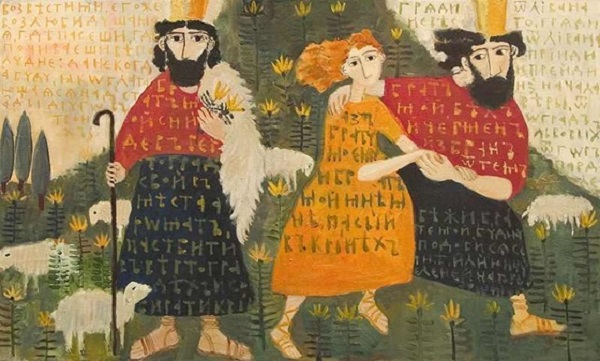The Song of Songs and Divine Love
10 January 2018In memory of Papa-Efraim Katounakiotis
The Song of Songs is the jewel of the Old Testament and, together with the Gospel of Saint John the Theologian, constitutes the centre of divine Revelation.
It contains an astonishing message which is expressed with uncommon boldness: Christ, the Only-begotten Son of God, harbours for His Church, His Most Holy Mother- who represents the Church- and for each of us individually a love which is as profound, as powerful and as personal as that of a young groom for his beloved bride. Every Christian is called to this mystery of marriage with the Church, to union with it.
For Christ, and for us, as well, this love is a source of immeasurable, inexhaustible joy.

God expects from us a love similar to that which a young girl has for her beloved, a love that has all the freshness of first love.
Ecstatic with joy, the Bridegroom beholds the beauty of his spouse, beauty which, in reality, is His own work, a reflection of His effulgence and this is the same ecstatic joy that she feels when beholding the beauty of her Beloved: ‘Behold, you are fair, my consort; behold, you are fair , your eyes are doves (Song, 1, 14) – Behold, you are fair, my lover, and also beautiful (Song 1, 15).
He is happy and elated to be with us, and for us there’s no greater joy than to feel that He’s our companion, that we’re one with Him, in an enduring exchange of love, in the breath of the Holy Spirit which deifies us: ‘Arise, north wind, and come, south wind, blow upon my garden and let my fragrances be wafted’. (Song, 4, 16).
Of course, in the Song, human love is used allegorically and, thus marked, has to be interpreted spiritually. Spiritual realities, however, are no less real than those which are material and tangible. Nor is love any less true, less powerful, if the beauty which gives rise to it and nourishes it is the spiritual beauty of the Other and not His physical attraction.
The beauty of the Bridegroom and the Bride in the Song doesn’t lie in the bodily aspect. The Song invokes it purely and simply to symbolize the internal beauty, the beauty of that love which is capable of offering even life itself for the Other. It’s also the beauty of humility, of patience and of sweetness…
For a pure heart, this love, which was given to it so that it should have ‘eyes like a dove’, is more attractive than physical beauty and when you gaze upon it, it becomes a source of ineffable joy and ecstasy.
The kiss and the demonstrations of tenderness which are invoked in the Song represent the gifts which Christ deposits in the depths of our heart. They allude to the favours we receive from the brush of His Grace, which make us feel and experience the pleasurable fruits of the Holy Spirit, that is ‘ love, joy, peace, forbearance, kindness, goodness, faithfulness, gentleness and self-control’ (Gal, 5, 22-3). ‘A garden enclosed is my sister, my bride; a garden enclosed, a spring sealed. Your shoots are a paradise of hanging pomegranates, camphor, with spikenard’ (Song, 4, 12-13).
When we gaze upon the divine perfection of Christ our Beloved, when we feel in our hearts the innermost attraction and sweetness of those spiritual gifts which fill Him and which flow outwards to us, we then are overcome with a joy and pleasure which is of another order entirely, though still real, incomparably more sound and deeper that that which is felt by earthly lovers.
These innermost brushes of divine Grace are the evidence and expression of the infinite tenderness of Christ, Who wants us truly to live His own Life, Who wants us to be nothing other than with Him, one and the same Body which is animated by the Divine breath, which is imbued with the same essence, in an exchange of mutual love.
Every internal movement which the Spirit stimulates within us, every desire for what is good, every fine inspiration we feel, are indications of what our Beloved engenders within us out of a true, personal, tender love, like the examples of tenderness that a worldly husband has for his wife, but infinitely greater. ‘I wish that his left hand were under my head and that his right hand held me up’ (Song, 2, 6).
Christ doesn’t expect us to submit to a cold, impersonal, moral law, but rather that, at every moment of our lives, we should deny our will, our preferences, our desires, so that we obey His word and His divine initiatives, so that we abandon ourselves with confidence to whatever He allows to befall us, because we love Him, because we prefer Him to all else, because in every circumstance, we want to show Him our love, in return for* His. A love which will be expressed with our words, prayers and actions, even with our silence, full of confidence and self-abandonment towards Him.






